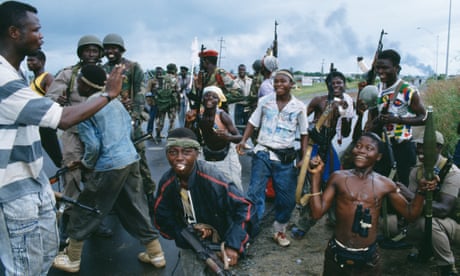
Senators in Liberia have voted overwhelmingly to establish a war crimes court, two decades after civil conflict ended in the west African country.
The new court will investigate and try crimes against humanity and corruption committed during Liberia’s two civil wars between 1989 and 2003, which killed up to 250,000 people.
Peterson Sonyah, the executive director of the Liberia Massacre Survivors Association, said: “This is what we have been advocating for over the years. Establishing the court will help justice in Liberia and will also address the culture of impunity which has become widespread in Liberia.
“With this court, Liberia can move ahead better and ensure people who committed crimes against humanity are held accountable.”
No one has been tried in Liberia for crimes committed during its two civil wars, the first of which ran from 1989-97 and the second from 1999-2003.
Former rebel commanders Alieu Kosiah and Kunti Kamara have been tried and convicted for war crimes in Switzerland and France, respectively. Another former commander, Martina Johnson, is awaiting trial in Belgium.
The former Liberian president Charles Taylor was sentenced to 50 years in prison for crimes committed in neighbouring Sierra Leone after a hearing at a special court at The Hague. His son, Charles “Chuckie” Taylor Jr, was tried in the US and sentenced to 97 years in jail for torture during Liberia’s civil war.
Civil society has been calling for the creation of a court since the end of the war, when thousands of people were mutilated and children were recruited as soldiers and sex slaves.
Liberia’s truth and reconciliation commission recommended a court be established in 2009, but there was little political appetite to move forward until President Joseph Boakai promised to explore the possibilities during his inauguration in January this year.
Senators voted 27 out of 29 in favour of the court last week, after the resolution was backed by MPs in the lower house in March.
Boakai still has to give his final approval and will need to ask the international community for money to fund the new court.